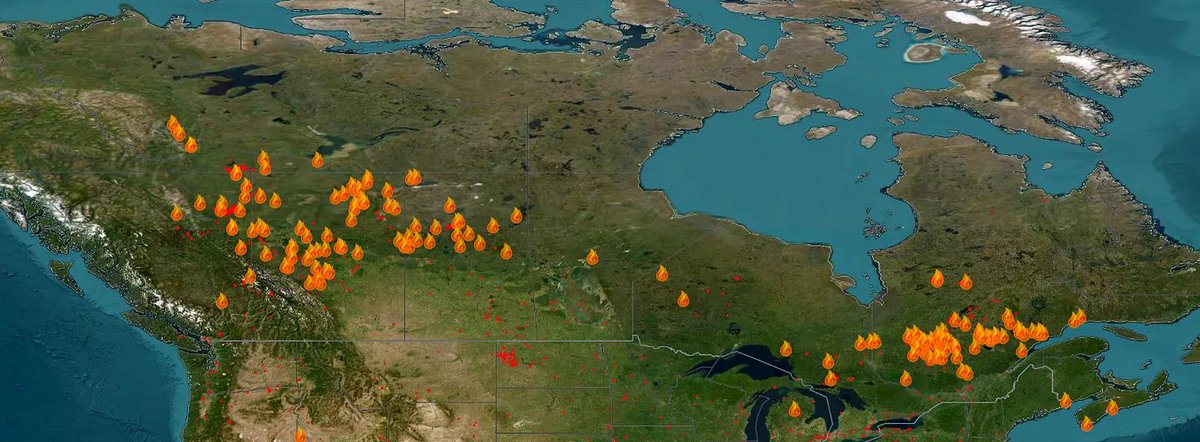The Link Between Climate Change and Catastrophic Wildfires
Catastrophic wildfires have created record-bad air quality across Canada and the Eastern US. This blog looks at the role climate change plays in these events, as well as how hot and dry conditions exacerbated by climate change increase extreme wildfire risk.

Zeke Hausfather
"A tireless chronicler and commentator on all things climate" -NYTimes. Climate lead @stripe, writer @CarbonBrief, scientist @BerkeleyEarth, IPCC/NCA5 author.

-
Catastrophic wildfires have created record-bad air quality across Canada and the Eastern US.
— Zeke Hausfather (@hausfath) June 8, 2023
Its too early to know the role climate change played in this specific event, but as we discuss at The Climate Brink it will likely make fires in Canada worse: https://t.co/zG2uFwe52A pic.twitter.com/Y6M7bKBgTL -
There is a clear link between hot and dry conditions exacerbated by climate change and extreme wildfire risk. This is particularly true in high-latitude regions like Canada. https://t.co/2hsl4Oid3U
— Zeke Hausfather (@hausfath) June 8, 2023 -
A recent study by scientists at the Canadian Forest Service argued that a “broad consensus indicates that climate change will cause larger and more frequent fires, resulting in a growing annual area burned in much of Canada.” https://t.co/297WgmgRqj
— Zeke Hausfather (@hausfath) June 8, 2023 -
Similarly, the recent IPCC 6th Assessment Report (WG2) noted that “wildland fire was identified as a top climate-change risk facing Canada”: https://t.co/BXRyqIuVCN
— Zeke Hausfather (@hausfath) June 8, 2023 -
The figure below, from the IPCC 6th Assessment Report WG1, shows medium confidence of increased fire weather by the end of the century in both Eastern and Western Canada, as well as an upward observed trend in fire weather in the historical record Western Canada. pic.twitter.com/U7VGnaVCWN
— Zeke Hausfather (@hausfath) June 8, 2023 -
A 2017 paper by Dr. Mike Wotton and colleagues found large and significant increases in the percent of fire weather days (where active fire growth potential exists) across different regions of Canada across three different Earth System Models. https://t.co/JrYAI9IeQs pic.twitter.com/nr1iZrUn90
— Zeke Hausfather (@hausfath) June 8, 2023 -
A more recent 2021 paper by Dr. Xianli Wang and colleagues finds similar results, with a large increase in annual area burned, number of fires, and maximum fire size across Canada, with a partially strong percent increase in Eastern Canada in the latter half of the 21st century. pic.twitter.com/jsQ0IVTFsJ
— Zeke Hausfather (@hausfath) June 8, 2023 -
Similarly, Wang et al 2020 finds that “across Canada an extreme fire year could be four times more common by the end of the century, and more than ten times more common in the boreal biome (assuming other factors remained constant). https://t.co/297WgmgRqj
— Zeke Hausfather (@hausfath) June 8, 2023 -
Climate change is not the only thing making wildfires worse. A legacy of wildfire suppression has resulted in extensive fuel loading in many forests that prime them for catastrophic wildfires. pic.twitter.com/P8YAfRLB0W
— Zeke Hausfather (@hausfath) June 8, 2023 -
While mitigating climate change is important to prevent fires from getting worse, even if we get emissions down to zero the world will not cool back down for many centuries to come. Only more effective forest management can reduce the impacts we are experiencing today.
— Zeke Hausfather (@hausfath) June 8, 2023 -
For more details, read our new post over at The Climate Brink, and subscribe (its all freely available!): https://t.co/zG2uFwe52A
— Zeke Hausfather (@hausfath) June 8, 2023 -
Also see this excellent thread by @yboulanger2 laying out the evidence (Twitter can translate it from French for non-speakers): https://t.co/Hics1Oo43x
— Zeke Hausfather (@hausfath) June 8, 2023
